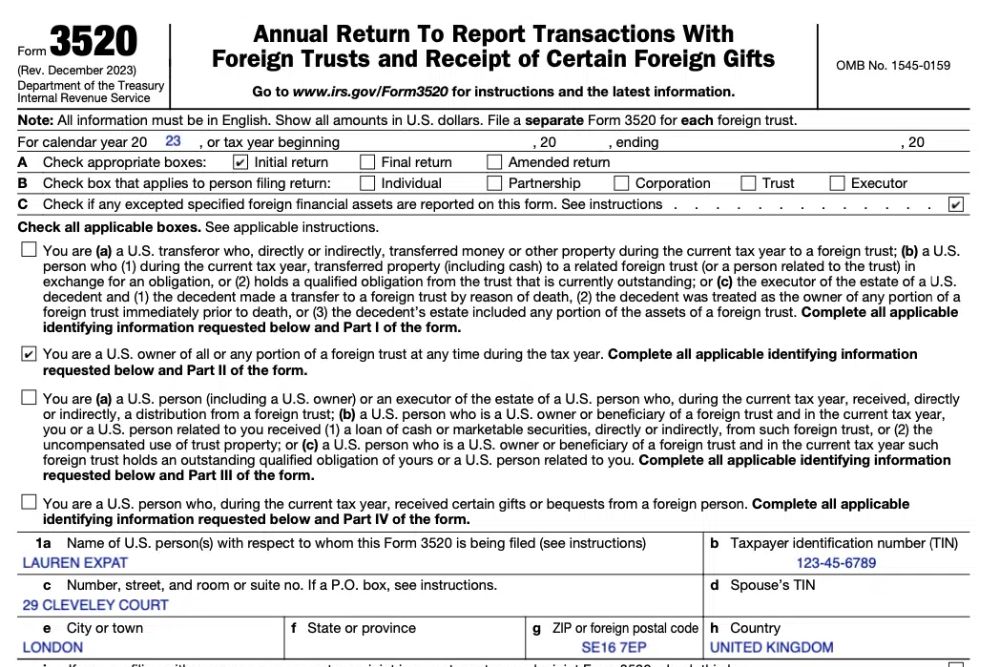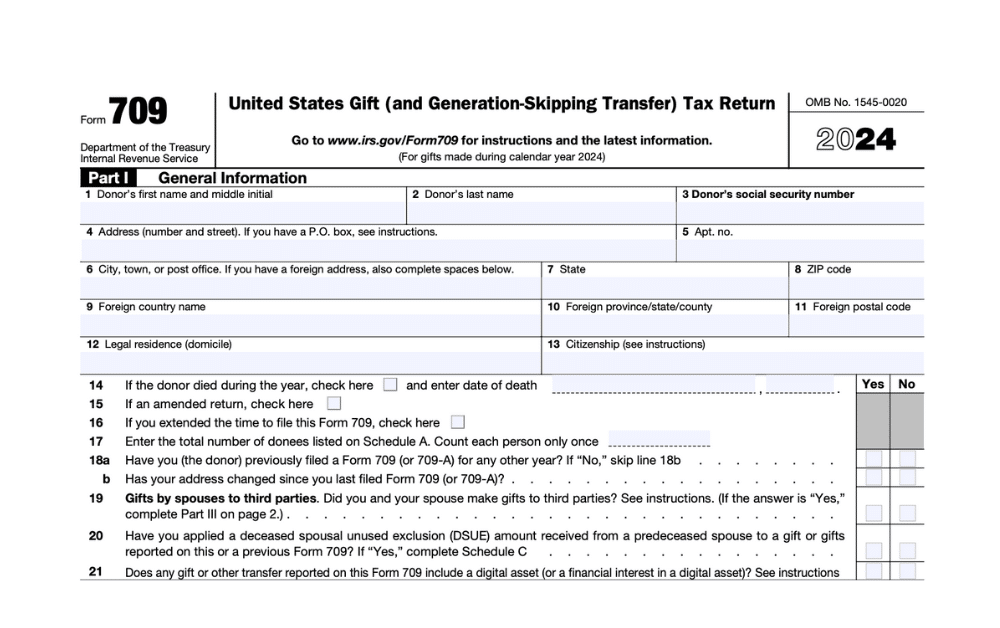Foreign Gift Tax: Reporting Rules & Exemptions Explained

As an American living abroad, you may wonder whether you will be taxed on any foreign gifts you receive. The short answer is no, but with an important caveat. While the US federal government does not impose a tax on the person receiving a gift, foreign or otherwise, you must report any foreign gifts you receive above certain thresholds. Failing to do so could result in sharp penalties.
Here’s what you need to know about foreign gifts to help you avoid those penalties and remain compliant with IRS policy.
Key Takeaways
- Foreign gifts are not taxed in the US, but they must be reported if they exceed IRS thresholds.
- Gifts from non-US persons exceeding $100,000 must be reported on Form 3520.
- Failure to report foreign gifts can result in significant penalties.
- Certain foreign inheritances may also require reporting.
What Is a Foreign Gift?
A foreign gift refers to money or property received from a non-US person that you treat as a gift and exclude from your gross income. Types of foreign gifts include:
- Cash transfers from non-US individuals
- Property or assets received from abroad
- Inheritances from foreign estates
For example, let’s say Mark moves from the US to Italy. While there, he marries Francesca. As a wedding present, Francesca’s parents gift the happy couple an amount equal to $50,000. Because this money came from non-US citizens residing in a foreign country, it would qualify as a foreign gift.
Payments for products or services are not gifts, as this is considered income. Direct transfers from foreign employers are also not gifts.

Are You Ready to Move Abroad?
Choose the answer to each question that best describes you or your current situation, and learn how ready you are to start a life abroad.
Are You Ready to Move Abroad?
"*" indicates required fields

You have an adventurous spirit but you may need to prepare a bit more to ensure a smooth transition abroad. Consider researching more about the cultural, legal, and financial aspects of living overseas.
You’re on the right track. You’ve started to think about what life abroad will entail. Keep building on your preparations to avoid any surprises once you’ve moved.
You’re ready to move abroad! You seem well-prepared and have done your homework! You’re ready to embrace the expat life with confidence.
Does the US Have a Foreign Gift Tax?
The US federal government does not impose a tax on the recipient of a foreign gift. This is good news for Americans living abroad who may receive gifts from foreign family members, friends, or business associates. However, the IRS does require reporting if the gift exceeds certain thresholds:
- $100,000 from a foreign individual or estate
- $20,116 from a foreign corporation or partnership (this amount tends to increase each year)
These thresholds apply to the aggregate amount received from the same source over the entire tax year, not just single gifts. The “same source” rule also applies if you receive gifts from related foreign persons.
For example, let’s go back to Mark and Francesca. They already received a gift of $50,000 from Francesca’s Italian parents. Now, let’s say Francesca’s uncle gives them a gift of $40,000, and her brother gives them $20,000. Because these gifts all came from foreign persons who were related to one another, they count as a single source. And since the combined value of the three gifts adds up to more than $100,000, Mark would be required to report this foreign gift to the IRS.
Note that while these gifts are not taxable, if the gift generates income (such as rental income, interest, dividends, or capital gains), that income is taxable, even though the gift itself is not.
How to Report a Foreign Gift
If you’ve received a foreign gift that exceeds the threshold, you’ll have to report it using IRS Form 3520. This form is filed separately from your annual tax return (Form 1040) and cannot be filed electronically. However, it has the same due date as your standard tax return — April 15, or June 15th if you live outside of the US and Puerto Rico. If you have requested an extension for your tax return, the deadline for Form 3520 is pushed back to October 15.
Get the Free Download That Makes Filing Taxes Simple
"*" indicates required fields

Penalties for Failing to Report a Foreign Gift
The IRS takes foreign gift reporting seriously, and failure to comply can result in significant financial consequences. Understanding the potential penalties can help emphasize the importance of proper and timely reporting.
Failure to report a foreign gift can result in significant IRS fines. Penalties include:
- 5% of the total value of unreported gifts for each month you failed to report
- Penalties can accumulate up to a maximum of 25% of the gift’s value
- Higher fines for continued non-compliance or willful violations
For example, if you received a $200,000 foreign gift and failed to report it for four months, you could face a penalty of $40,000 (20% of $200,000). This represents a substantial financial impact for failing to file the proper paperwork.
The IRS may audit or request additional documentation for unreported gifts, potentially further scrutinizing your tax situation.
Despite this policy change, compliance with reporting requirements is still crucial to avoid potential issues. Because there is no foreign gift tax when you report gifts as required, it’s all the more beneficial to follow the law.
Are There Exemptions for Foreign Gift Reporting?
Fortunately, not all gifts require reporting. Exemptions include:
- Gifts under $100,000 from foreign individuals
- Regular bank transfers under IRS thresholds
- Transfers between foreign and US joint accounts
For example, if you receive a gift of $75,000 from a foreign relative, you don’t need to report it on Form 3520, since it falls below the $100,000 threshold. Similarly, small regular transfers from family members abroad typically don’t require reporting as long as they don’t exceed the thresholds when aggregated.
Inheritance vs. Gift
Inherited foreign assets follow reporting rules similar to gifts. For tax purposes, the IRS generally treats inheritances as gifts from the estate of the deceased. If you inherit assets worth more than $100,000 from a foreign estate, you’ll need to report this on Form 3520, even if the assets remain abroad.
Understanding these exemptions can save you time and stress, but when in doubt, consulting with a tax professional is always advisable, especially when dealing with large gifts or inheritances from abroad.
Do You Need Help with Your Expat Taxes?
We hope this guide has helped you understand the tax requirements for foreign gifts. If you still have questions, just contact us, and one of our Customer Success Champions will be happy to help. If you need very specific advice on your specific tax situation, you can also click below to get a consultation with one of our expat tax experts.



